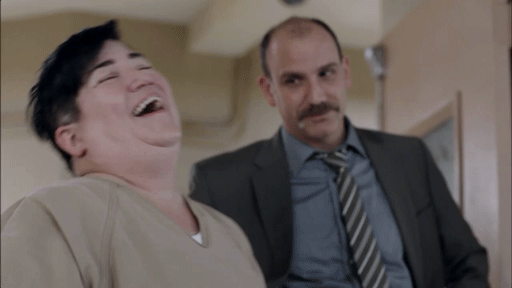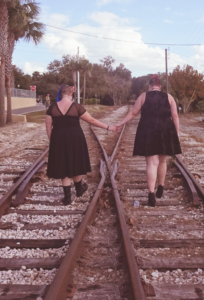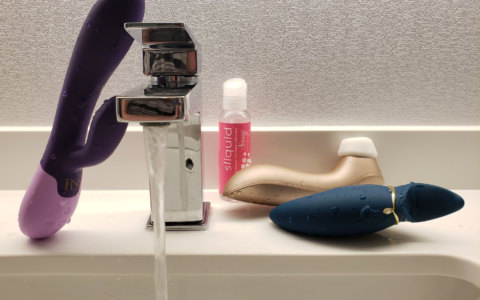This month, Buster and I are celebrating our first wedding anniversary. We’ve been together over ten years, but queers have only been able to get married ‘round these parts since mid-2015 and we were too poor to hop right to it when the Supreme Court finally got of its ass. I knew I wanted to write about getting married this month, I just wasn’t entirely sure what I wanted to talk about… Then Weight Watchers pulled some gross bullshit and I realized I wanted to talk about getting married while being fat.

Getting Married While Being Fat
My mother got married for the second time when I was around 12 or 13. The wedding was quickly planned and on a tight budget, so she impulsively bought a dress that was too small for her at a thrift store. She was hoping that she could “slim down” to suit its sizing in the few weeks before the wedding. And while I don’t remember much from the ceremony itself, I do remember my mother’s anxiety leading up to it. Despite her attempts to lose weight, she only managed to gain more, and absolutely hated the way she looked in the dress. Her weight fluctuation was actually the symptom of a medical issue that wouldn’t get addressed for years (howdy, anti-fat bias in the health care industry!), but at the time, it was a source of shame and anger.
Weddings and women dieting are almost undivorceable in my mind. Growing up, I overheard cousins exchange diet tips and unabashedly critique each other’s bodies every time one of them got engaged. My favorite movie genre – romantic comedies – is overflowing with frantic, comedically-framed scenes centered on diet-desperate brides-to-be. Every grocery check-out line I’ve ever stood in has been littered with magazines promising thinness in time to say “I do.” Even when I peruse gay wedding or engagement tags on Instagram, I see the haggard selfies of queer women announcing their dieting progress, some doing it together like it’s just another part of planning for the ceremony. Like bodies are as normal to tailor to a certain wedding aesthetic as tablecloths and flowers.
I’ve been fat all my life, and so has my wife. We were fat kids, fat teenagers, and we’ve been fat adults all throughout our relationship – including a year-long stretch in our early 20’s where, too ignorant to apply for foodstamps but too poor to stock our own cupboards, we ate just one meal a day. Not being fat has never been a legitimate option for us, no matter how many beach or theme park miles we regularly traverse together. And I’m happy with that.

More than a double chin. Arm fat that partially or fully sagged over elbows. Not having distinguishable ankles. More than a single stomach roll. A stomach that protruded farther than my breasts and obscured the view of my pubic mound. These were my “unacceptable” body markers, the dimensions of my line in the sand. I never found them “too fat” on other people, but I still feared the possibility of my own body changing to these proportions. I had learned to accept fat bodies except for mine. I was only allowed a degree of fatness.
I think it’s safe to say that most fat people – especially fat women and DFAB folks – have, at one time or another, maintained a secret list of things they think “make it okay” for them to be fat, like the aforementioned “good fatty” who works out and regularly eats rabbit food. These bizarre and logic-faulty bullet lists include food choices, behaviors, and body shapes that we individually think are “acceptable” to have/do/be, and serve as flimsy and usually ineffective shields for when we encounter fatphobia. We think things like ‘I shouldn’t let that insult get to me because I didn’t overindulge with desert today, I’m funny and likeable, and I can see my feet when I look down!’ The criteria is all entirely irrational and founded on internalized fatphobia, and even if we do meet all of these self-imposed standards, it doesn’t actually protect us. Only having two chins and being physically active hasn’t shielded me from feeling like dirt every time someone’s called me a fat bitch from their rolled-down car window or when I flip through a dozen comics and the only body like mine is the bad guy or the incompetent best friend.
But the irrationality didn’t stop me from clinging to my lists over the years, holding my double chin high and pretending that I could both aggressively reject society’s hatred of fat bodies and court my own self-hatred like it was more reasonable. Whenever my wife admitted to hating parts of themself I’d be confused and outraged, pointing out how beautiful they were and how they shouldn’t let others’ fatphobia dictate how they felt about themself, all the while still considering my own self-hate – often about the same thing they were unhappy with – perfectly reasonable. It couldn’t possibly be fatphobia if it only pertained to me, right?

I’d like to say that I left my lists behind because I grew wise, or because I was struck one day by a self-love epiphany. But while either of those would make for a more inspiring ramble, the blunt truth is I just got older and fatter.
Depression and happiness both share a clever trick: they can make you stop looking at yourself. For some people, depression manifests in constant self-criticisms; for me, it often removes my attachment to my own humanity, and thus, to my body. Likewise, happiness – for me – burns bright and distracts from smaller, colder things like self-hatred, and all of the physical self that hatred fixates on. In the past five years, I’ve had mostly the former but some of the latter, too, and – often without my active notice – my body has changed.
I don’t remember when my ankles became less pronounced. I don’t remember when my stomach started curving out farther than my (admittedly small anyway) boobs, or when I stopped being able to look down and immediately see my crotch instead of my stomach roll. I don’t remember when my arm fat started peeking out over my elbows, or when the weird fat roll that’s always been under my breasts started getting big enough to be seen through t-shirts. I don’t remember if maybe I remembered before and I just don’t remember now.

And I don’t know how my body will change further as I approach 30.
But I do know, and do remember, that when I first looked at my wife and I’s engagement photos last December, I saw for the first time visual evidence that my elbows were now those elbows: the kind of “unacceptable” elbows I’d feared all my life, with a little roll of fat encroaching on the bend of my arm.
And while the visual surprised me, because I haven’t had a picture feature that part of my body from that angle since I was a child, it didn’t bother me like I might have expected it to. I didn’t immediately feel like I’d crossed the uncrossable line I’d drawn in the sand. Instead, it felt like I’d finally given the sand a good kick and scattered the last lingering concept of unacceptable fat into the wind. And the kick wasn’t even an intentional one – rather, it was probably an idle sweep of my foot, maybe a step I’d taken while walking across the beach to meet my wife at the water’s edge. It likely just breezed away while I enjoyed the chill of bubbled surf swirling around my fat, indistinct ankles.
My mom’s second marriage was a short and unhappy one, so that wedding and its ill-fitting wedding dress bring back sour memories for a number of reasons. But it’s my mother’s frantic, angry mumble of “I’ve got to get out of this fucking thing” the second we got back to her mother-in-law’s house that sticks out the most in my mind, because I realized that even during the ceremony itself she was fixated on how her butt looked in the dress and how she’d failed to meet her own body expectations. Expectations founded on hatred for fat bodies instilled in her by our culture. She wanted to escape her image and her expectations as quickly as possible.
And “escape” shouldn’t be one’s dominant thought while getting married. It shouldn’t be what you’re thinking about beforehand, either, no matter what gossiping cousins, lovably clueless rom-com heroines, and garish wedding magazine covers tell you. We all know wanting to bolt from your fiance is an unquestionably bad sign – why is wanting to run away from yourself, or even just thirty pounds of yourself, considered so much more reasonable? Both are an indication that some part of this equation is off. If a woman is frantic and unhappy with an impending marriage to someone, it’s probably because she doesn’t love her betrothed. Cousins, magazines, and especially romantic comedies, understand that plotline. But if a woman is frantic and unhappy with her weight and spends the months or weeks before her wedding skipping lunch, living on a stairmaster, and pinching her arm fat while crying over a calendar, cousins and magazines and rom-coms – and fucking Weight Watchers – only claim they understand it.
I was fat when I got married. I was fat before I got married, I’m fat as I write this post, and I’ll be fat for my second, tenth, twenty-fifth, and fiftieth wedding anniversaries. I’m fat when I eat healthy meals and I’m fat when I eat a second slice of pie; I’m fat when I spend Saturday with a laptop perched on my big belly to binge-watch Elementary and I’m fat when I walk ten miles around a theme park just cus; I’m fat when I’m a lazy and I’m fat when I’m productive; I’m fat no matter how many rolls, chins, or ankles I have or don’t have. I’m fucking fat!

And I got married in a dress that accentuated the tuft of fat that protrudes beside my armpits, with my big thighs on pale display and my bare arms showing that dreaded flab over my elbows, and yet escape – and the ridiculous “acceptable fat” list that would have justified wanting to escape – was the last damn thing on my mind. Because I was getting married to the most amazing person in this truly awful world, and through sheer apathy I’d let go of all the hateful strings that had held my mother back. Strings that had held me back. Strings that can still sometimes hold me back, when I let them. I work every day not to let them.
And I have never been happier.




1 Comment
I’m fat too. I haven’t always been, my fatness is in large part a side effect of a lifetime on bipolar meds. I’ve also recently developed PCOS (and was subsequently fatshamed by not one but two doctors ). Regardless, accepting my body as is was hard for me. I had an eating disorder in my teens and have been as small as a size 0 when I was at my worst. I still have dreams that I’m thin again and buying jeans from the gap. Then I wake up in my 300 lb body and want to cry. It’s interesting to me that I don’t care if other people are fat, but I have a problem with myself being fat. What you said about acceptable fatness rings true for me too. Something about being 300+ bothers me a lot. Like, I was ok with myself for the most part at 250, but 300 has presented a lot of physical challenges (I can no longer fuck myself with a dildo, for example. I just can’t reach over my damn belly. I’m also suffering from chronic back pain.
And getting married is a whole other beast. My father (who I no longer speak to for so many reasons), gave me a dieting book about the apple cider vinegar weight loss cleanse thing right before my wedding. I wasn’t even fat then, a size 10. But he and my step mom told me many times my ass was too big if I even hovered past a size 8. He and my step mom are by far the most fatphobic people I’ve ever encountered. They diet themselves constantly. Sometimes I’m really baffled by people who can live like that, forever on a diet.
Anyway, this was a great post and I hope you don’t mine my novel of a comment.